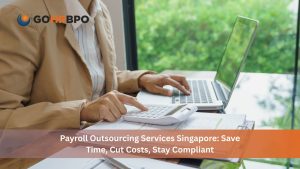Outsourcing payroll services has proved to be substantial for a company’s growth. Payroll is one of the most complicated and time consuming processes that a company goes through. Functions of payroll outsourcing includes, calculating salaries, generating paychecks, processing taxes with the compliance of labor laws and other regulations. In the process of companies keeping up with ever-changing laws and tax rules, it becomes important for a company to ensure its compliance. A study by Accountancy & Business Magazine (Singapore) found that over 30% of businesses in Singapore faced penalties related to payroll errors in the past year. Not following these legal implications of payroll outsourcing can result in a company to face high penalties and that can cause damage to their reputation. Before we dive into exploring several legal implications of payroll outsourcing in the current day and age, let’s focus on how payroll outsourcing works in Singapore and what benefits companies seek from it!
How do companies benefit from Payroll Outsourcing?
- Cost related benefits of outsourcing: A company can save a lot when choosing outsourcing. When outsourcing payroll, you don’t have to spend on expensive software and hardware nor do you have to train your inhouse staff, everything is ensured by the service providers.
- Ensured compliance and reduced risk: Outsourced payroll services in Singapore ensure compliance to labor laws and regulatory rules of MoM. They have in-depth knowledge on tax laws and stay up to date with any changes in legislation. This helps companies avoid the risk of fines and costly legal battles.
- Productivity Boost: A study by Robert Half Singapore concluded that Singaporean businesses spend an average of 20 hours per month on payroll tasks. By outsourcing a company can ensure that they can invest their resources in core business activities rather than performing administrative duties such as generating payrolls.
- Employee Satisfaction: Payroll services also provide employees with online portals that can help them track their payroll information like paychecks, tax forms, etc. Hence, reduced stress and improved productivity.
Legal Implications of Payroll Outsourcing in 2024
With Outsourcing, some legal implications also come by when a company decides to choose its payroll service provider. For a company to experience the best payroll server, they should review the certifications, providers history along with other client recommendations. Better results from a payroll outsourcing service gives a way to certain legal implications that come into play.
1. CPF contributions for Employees
In order to comply with the rules and regulations set up by MoM, employers in Singapore are required to register their employees with CPF (Central Provident Fund) based on their age, nationality and salary. The employer contribution rate varies from 7.5% to 17% depending upon their salary.
2. Minimum wage and Leaves
Singapore does not impose minimum wage which is subject to agreement and negotiation between parties. In accordance with the Employment Act, the employers must pay the salaries at least once a month and within 7 days after the end of notice period, there are few exceptions like resignation without notice period.
3. Keeping accurate records of Pay slips
Under the act, employers are responsible for keeping accurate records of their employees salaries and benefits, they should also provide payslips to their employees. These records and payslips should be kept for a minimum of 3 years.
4. Itemization of a Pay slips
Under Singapore Employment Act, salary slips should be itemized and must contain the following:
- Full name of Employer
- Full name of Employee
- Date of payments
- Basic salary (hourly, daily, no. of hours, etc.)
- Start and end date of salary period
- Allowances
- Additional payments
- Deductions made during the salary period
- Overtime hours and pay
- Net salary paid in total
Conclusion
Payroll outsourcing services can present a number of benefits when they are in compliance with the laws and regulations. An organization should carefully negotiate contacts and monitor that the payroll service meets all the legal requirements. Finding a smooth payroll service provider that complies to all regulations can give a hard time, need help finding one that suits your business requirements? GOHRBPO can do just the same for you. Visit GOHRBPO for more information.






